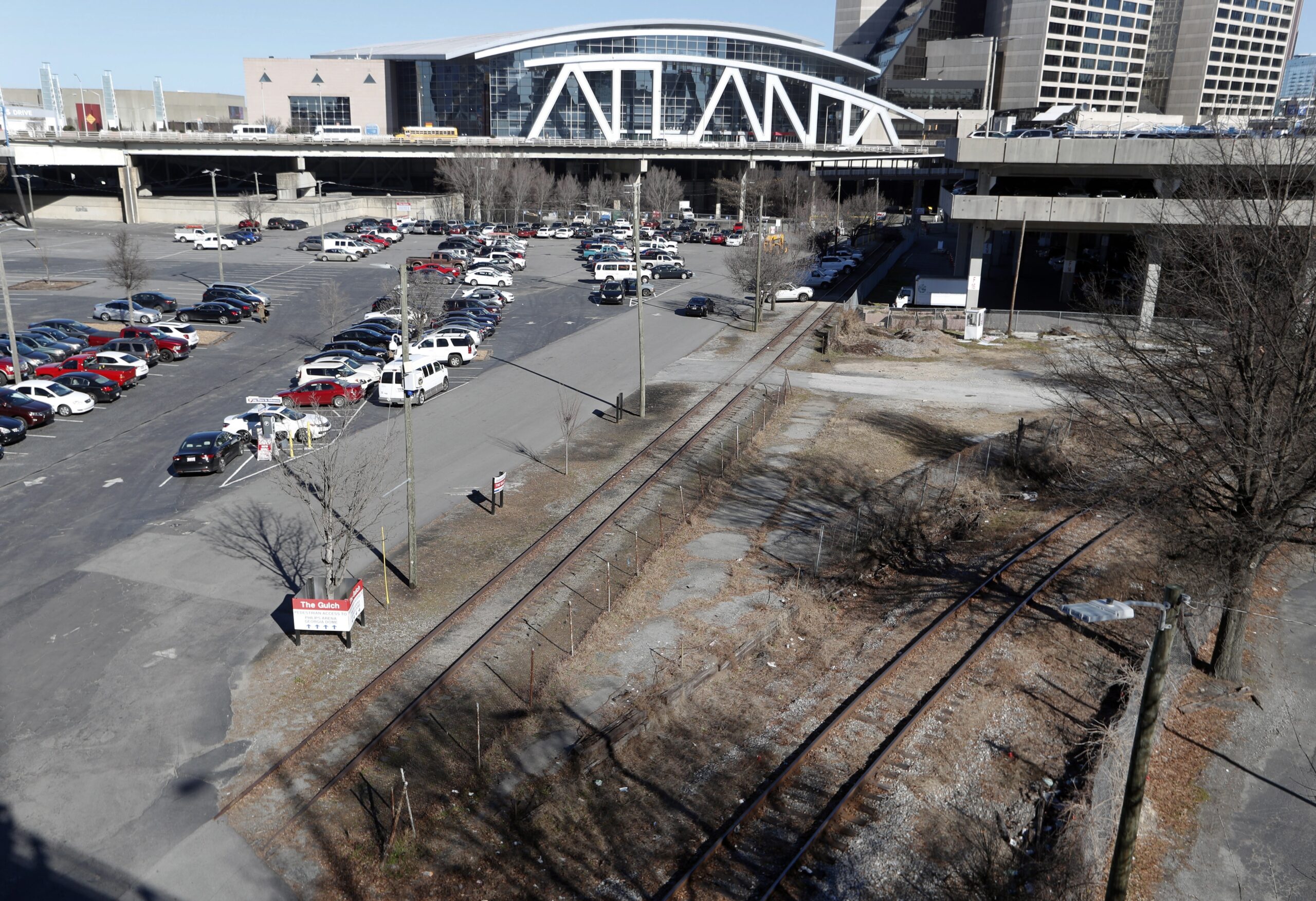City Council Weighs Gulch Deal, Questions Remain

The Gulch deal would be the biggest real estate deal Atlanta has ever done, and it’s complicated, said Councilmember Matt Westmoreland.
John Bazemore / Associated Press
All week, City Council has debated and questioned a proposed deal to develop the Gulch — about 40 acres of railroads and parking lots beneath what is now State Farm Arena.
The developer, CIM Group is asking for up to $1.75 billion in public funds to turn the chronically empty Gulch into a massive mixed-use project.
To do it though, CIM Group needs City Council to sign off on some of the public financing, and after three public meetings on the topic just this week, it’s still not clear whether enough councilmembers are convinced.
It would be the biggest real estate deal the city has ever done, and it’s complicated, said Councilmember Matt Westmoreland.
“When I talk to folks and people stop me in the community and they say don’t do this, they think what I’m being asked to do is write a $1.75 billion check to this developer to make this happen,” he said. “And that’s not at all what’s happening. It’s not that existing money is being handed over. It’s that money that doesn’t currently yet exist would be used to help fund this project over the next three decades.”
That means future tax money that the City, county, Atlanta Public Schools and the state have agreed to give up. It breaks down to about $1.25 billion in state sales tax and $500 million from the extension of the Westside Tax Allocation District, which pulls property tax money from the City, county and Atlanta Public Schools. City officials pointed out this is an unprecedented commitment from the state on an Atlanta project, and that CIM Group originally asked for $5 billion.
“And then once you understand that, then you have to have a conversation about whether that’s an appropriate way to divert public dollars for the next 30 years and what is the public getting in response to the money that they’re forgoing,” Westmoreland said.
“At the end of the day you have to line up what’s being asked of the city financially, what are we receiving in terms of goods and services and money, and then make a decision about whether you think it’s a good trade,” he said.
City officials say right now the land generates little to no tax revenue and attempts to develop it have failed since the 1970s. It’s a complicated and expensive piece of land because there are five different property owners involved, officials explained, and in order to begin any construction, an about $500 million dollar platform needs to be built to bring things up to street level.
The expense of the platform, plus the cost of the land has made it prohibitively expensive for the City to do on its own, said Alvin Kendall, a lawyer working with the City and Invest Atlanta on the deal at a Thursday work session.
This deal, officials said, is a rare chance to change that and gain something from the property.
“The real answer is that we’re not giving anything away because there’s probably never going to be any development in the Gulch,” said Peter Andrews on Thursday, a lawyer with Greenberg Traurig who is also representing the city and Invest Atlanta. “There’s nothing there today.”
Plus, there are some other perks the city has negotiated, like an unprecedented $40 million for affordable housing and economic development funds, a projected 35,000 – 40,000 permanent jobs and a new fire station. CIM has also agreed to at least 20 percent affordable housing units and 38 percent minority/women-owned businesses on site.
Andrews highlighted that 70 percent of the project’s total costs and expenses would be paid by CIM Group.
After questions from Councilmember Amir Farokhi, CIM Group representatives confirmed that they will maintain right-of-way on either side of the active Norfolk Southern rail lines, and that nothing precludes the possibility of commuter rail sometime in the future.
At a committee meeting earlier this week, Mayor Keisha Lance Bottoms strongly urged the council to vote on this at its meeting Monday. She said a mysterious, Fortune-500 company headquarter relocation hangs in the balance.
“I don’t know what else you can ask for in this deal,” she said. “To hold this in committee will put into jeopardy a corporate relocation from another state where this other state has already become very aggressive.”
“Nobody wants to see an opportunity for a new employer in the city to be lost,” responded Councilmember Natalyn Archibong at that meeting. “The negotiations that have happened ought to leave space for us to deliberate. It feels like a squeeze….I don’t want to feel badly because I want to do my job well. It’s not a no, it’s a not right now.”
Some councilmembers still have questions. Westmoreland, for example, said Thursday he’s not ready to vote on this on Monday.
Councilmember Cleta Winslow, on the other hand, spoke in favor of the deal and the rare opportunity to do something with the property.
“This is not me saying I’m going to vote yes or no on this project,” said Councilmember Amir Farokhi at the Thursday work session. “There is a broader political tone deafness to the fact that people are fundamentally fatigued in this city of funding big development projects where they feel like there is not clarity in the approach or seeing the benefit,” he said.
“The average person in this city sees $1.75 billion and thinks, ‘Oh my goodness, we’re giving a lot of money to this project. My trash isn’t getting picked up every week.’”
Archibong made the ongoing debate clear at Thursday’s five-hour work session.
“My inbox is inundated with constituents who are very, very concerned about this,” she said. “Minds and hearts clear? Probably not but we’re going to adjourn anyway.”
With a simple majority, the Council could bring the deal up for a vote on Monday.








